MOÑ about unstaged performances
Among the speakers — Nurbek Batulla, Tufan Imamutdinov, and Ruslan Rimanas
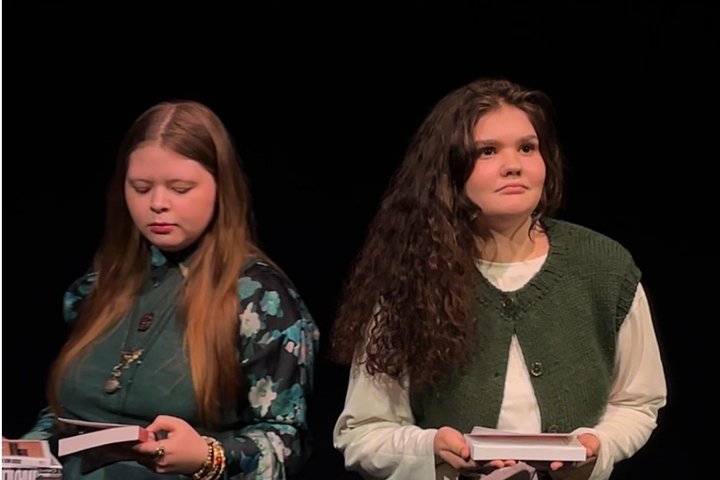
At the MOÑ theatre in Kazan, the Evening of Unstaged Performances has taken place. As they took the stage, Nurbek Batulla, Tufan Imamutdinov, Ruslan Rimanas, and other artists shared stories about projects that never became full-fledged productions. A significant portion of the audience left before the event concluded, but the organisers are confident that the evening should be repeated.
“But I didn’t get the grant for the play”
As the project’s initiator, PR director of the Living City foundation, Valeria Zavyalova, explained, while working at the Kazan Youth Theatre (TYUZ), she repeatedly witnessed how plays were conceived, developed, but ultimately never brought to the stage. Participants of the evening at MOÑ were selected through an open call, though there were also invited guests.
“Why not gather all these ideas, intentions, dreams, and aspirations into one evening and give directors, producers, actors, artists, and performers the chance to speak about it honestly and sincerely?” Zavyalova outlined the concept and gave the floor to Nurbek Batulla, warning that each speaker would have seven minutes.
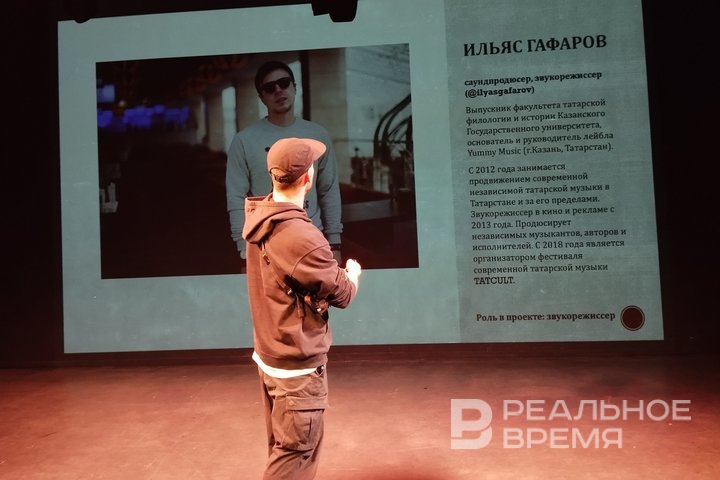
The choreographer first recalled that he had wanted to stage a ballet to the music of Mubai, but then he talked about a production he had mentioned during the performance of Engeme/ Conversation. Nurbek had wanted to stage a play by his father, Rabit Batulla, titled The Calm and had submitted a grant application twice.
“My father constantly hints at this, he has a ton of plays, and he writes at an incredible speed. He’s just prepared 1,000 pages, saying he’ll soon be 90. I can't keep up with reading them all, but I really enjoy his experimental plays, which he wrote when he was studying at the Higher Literary Courses.”
The Calm, according to Batulla Jr., is a dystopia in which one character is the accuser and the other is the accused. The play is dedicated to the revolutionary and victim of repression, Shamil Usmanov. In the end, the characters exchange their texts. The play was supposed to feature actor Iskander Khayrullin from the Kamal Theatre and rapper Usal.
Fish sing
The chief director of the Tinchurin Theatre, Tufan Imamutdinov, shared that he once came up with an opera titled Monologue of the Fish. He was inspired by books about the Holocaust:
“I read the memoirs of a boy who ended up in the ghetto at three years old and came out at nine. When he emerged, he saw the world and realised that the world was different. It was as if his memory of it had been erased. And that is true fascism — when memory is erased...”
Imamutdinov explained that fish have an operational memory span of just three minutes. In his project, the core idea was to have a kitchen setting where a girl would fillet crucian carp live on air. The process would be broadcasted on screens. Meanwhile, outside the kitchen, five arias of the carp would play, based on Biblical and Quranic texts written by Yoldyz Minnullina.
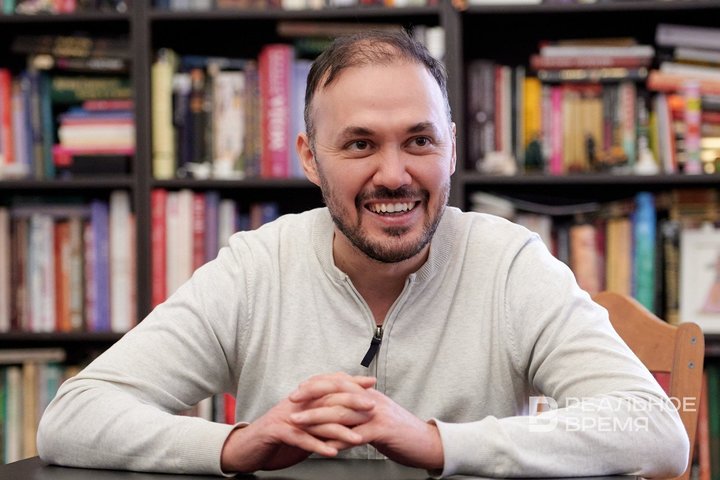
Some speakers not only talked about their projects but turned their presentations into performances. Damir Khani, for example, demonstrated a bar of soap to music while explaining the rules of Fight Club, which he had wanted to turn into a play back in 2016. Since then, much of the material had become outdated, such as the IKEA catalogs the characters flip through. The production was supposed to feature two actors. A lot of time was spent deciding on the roles: who would play Tyler and who would play the narrator? In the end, the creators realised that the two of them simply couldn't manage it alone.
The graveyard of productions
“Every director has a graveyard of plays, but I have certain successes in this area," began Nikita Belykh, who was discussing his project online.
An “open rehearsal” based on Edmond Rostand's comedy The Romantics, in the style of artistic realism with elements of improvisation, was buried twice. The format of the production was so simple that it almost didn’t require any props. The premiere was attended by the artistic director of the theater, who, despite the tickets being sold, removed the play from the repertoire because it didn't meet his aesthetic and other preferences. The production was then moved to another venue, after which the actors found themselves under scrutiny.
“Why hide it, we're in therapy, so I can speak honestly," said Alexey Kosogorov, the director and psychologist, who had hoped to stage a play about academician Pavlov for the drama theater of Velikiye Luki.
He accompanied his story with camera movements, even showing a model of the stage in the shape of a dog’s skeleton (by the way, Pavlov used to write letters to his pets).
Ivan Korsunovsky initially held a reading of a play about the repressions of the 1930s in Moscow, then in Tver (where his relationship with the lead actor didn’t work out). Later, after receiving numerous refusals from venues, he transformed the opera Stukachi into a video installation, and now — into a Telegram bot.
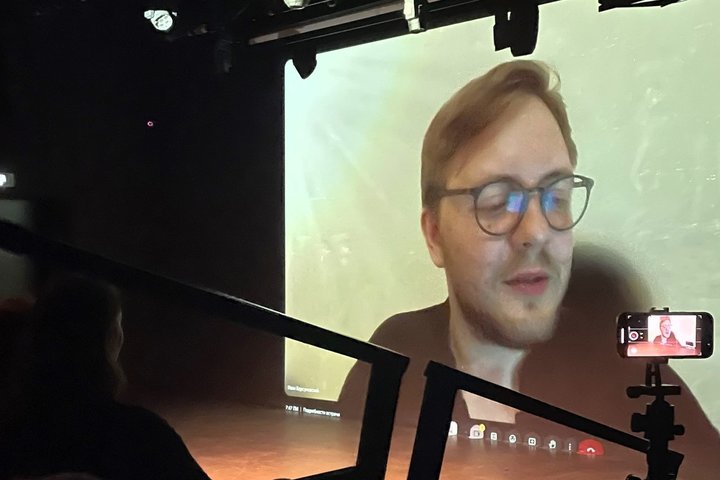
Polina Mikshis opened her presentation with a dance, while her colleague narrated a project that bore a suspicious resemblance to Shurale. Polina had developed the piece for a trip to Bolgar, but was ultimately unable to go: her actors either fell ill, left, or simply stopped responding.
Kamila Yamalova presented an excerpt from a play about Edith Piaf. Meanwhile, Anna Korobova chose to explore the life of someone she barely remembered — her own grandmother.
A similar theme was explored by Elshan Aleskerov, who recalled how, instead of bedtime stories, his father used to tell him tales of his military service. What always puzzled Aleskerov was that, in his father's eyes, those were the best years of his life. He had no intention of sending his own son into the army, yet he proudly showed off a well-kept demobilisation album and shared colourful anecdotes. Interestingly, the speaker noted, such stories — told as personal experiences — can be heard in virtually any region of Russia. Each tale, he said, was meant to be presented as an individual artistic project, while also incorporating video recordings of the actual storytellers, speaking candidly about their experiences and building a bridge between generations. Surely, such a performance deserves its place on stage?
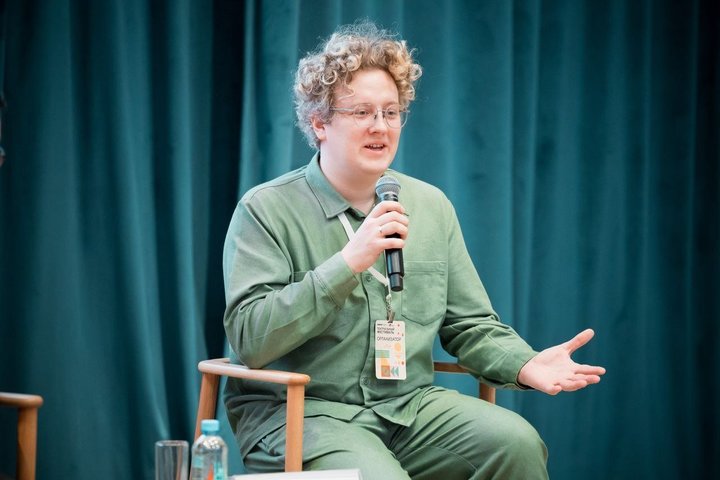
A Thousand and One Rimanas
Closing the evening — by then, a fair number of audience members had already left — was clown Ruslan Rimanas, who took to the stage with an entire bundle of ideas.
“Clowns are like children, dreamers,” he said. “That’s why new projects keep coming — from anything, really: a piece of music, an object at a flea market. Once, all I came up with was a title: ‘Well, hello there, blue night!’ How poetic that sounds! Beautiful — but I couldn’t think of anything beyond that.”
Rimanas, who spent ten years training at a choreography school, had also hoped to conduct an open workshop with the audience — but it didn’t quite take off. His mother is Tatar, and this inspired him to create exaggerated Tatar characters. That idea eventually evolved into Abau, a piece featuring enormous figures of a grandmother and grandfather — although he never managed to realise his vision of wolves of extraordinary proportions.
At Black Lake, Rimanas imagined actors in wading boots, surrounded by giant glowing fish. At the Selet camp, the clown staged performances right on the river.
For Vyacheslav Polunin, he was tasked with coming up with something on the theme of weddings — for instance, a dance of courting flamingos. Naturally, Rimanas dreamed of working with a live orchestra. Together with Nurbek, he conceived a performance for two clowns: one inhabiting the black-and-white world of Marcel Marceau, the other channeling the spirit of Oleg Popov.
There was also a plan involving frog costumes, but the idea fell through due to lack of funds — the dream, however, remains. Ruslan said he still wanted to remember how he once knew how to play the cello. And he still dreams of leading silent tours. Without a single word.
A year ago, Rimanas became a father.
“I want to create a show about becoming a dad,” he said. “I’ll show each month of my daughter’s life — how she’s growing up, and how I’m growing into the role of a father. I have a storage space — I don’t throw anything away. When my wife got pregnant, we had to clear out our two-room flat. It took two Gazelle vans just to move everything, and we had to rent a separate space.”
“I will definitely make it happen. I believe it’s important to keep dreaming, to keep imagining. Even when things don’t work out — just keep moving forward.”